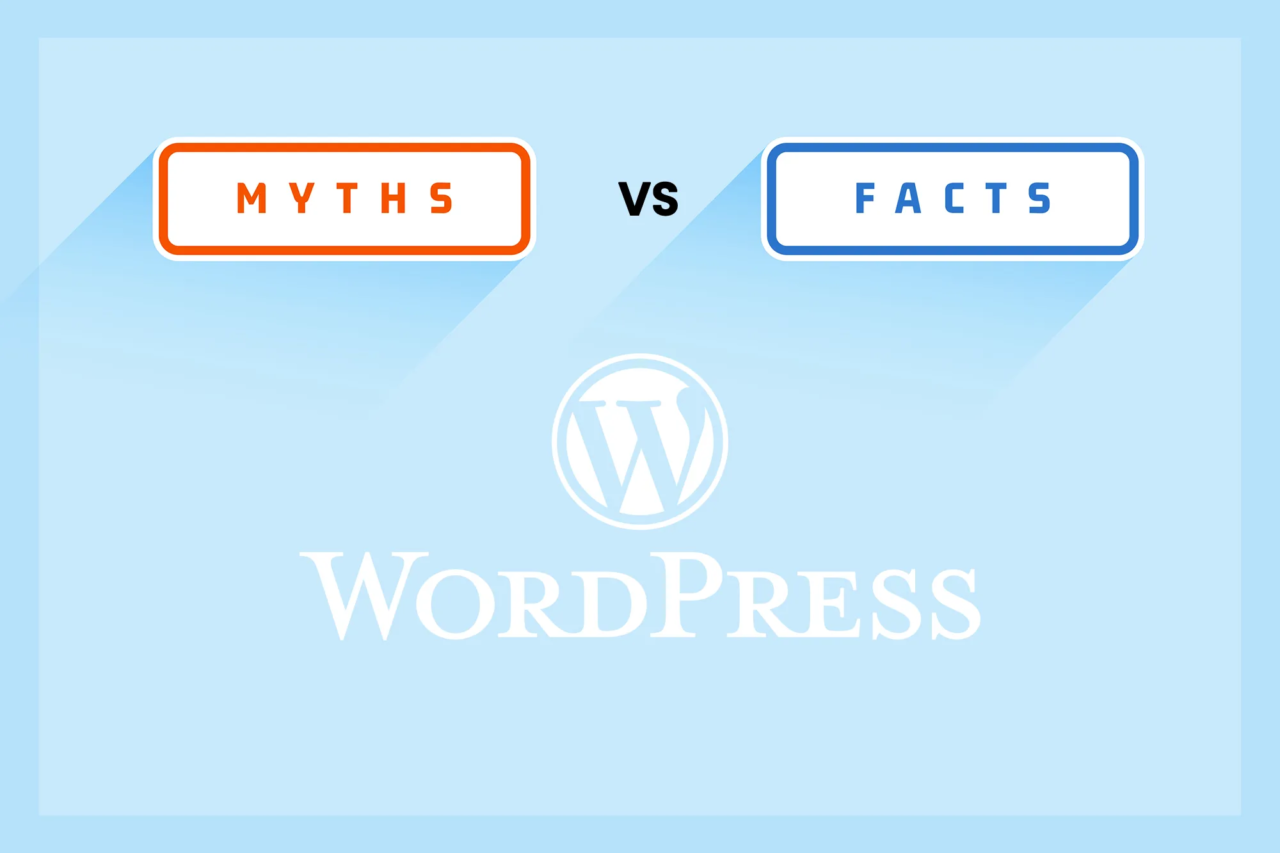You’ve Been Lied to About WordPress
7 Myths That Need to Die
June 25, 2025 / 5 min read

Why WordPress powers over 43% of the entire web – and why that’s not a fluke
Let’s get one thing straight:
WordPress is not “just a blogging platform.” It’s not slow, outdated, or insecure by default. And it’s definitely not something serious businesses should avoid.
And no, I’m not saying this because I only work with WordPress. I’m a web developer who can build anything from static HTML to fully custom CMS solutions. I choose WordPress because it’s reliable, flexible, packed with possibilities, and easy for clients to use and manage on their own.
Yet time and again, I meet clients who hesitate to use WordPress – not because of what it actually is, but because of what they’ve been told.
So, let’s clear the air.
In this post, I’ll break down 7 of the most common myths about WordPress, explain where they come from, and show you what’s actually true – based on real-world experience, not Reddit threads.
First, the numbers don’t lie
Over 43% of ALL websites on the internet are powered by WordPress.
That’s not a typo. That’s almost half the web – from small portfolios to major brands like:
- The New York Times
- Rolling Stone
- NASA
- Time
- Sony Music
- TechCrunch
- Harvard University
- The Walt Disney Company
You don’t attract that level of adoption if the platform can’t scale, perform, and adapt.
Myth 1:
WordPress is just for blogs
This one refuses to die.
Yes, WordPress started as a blogging engine back in 2003. But it hasn’t been just a blogging tool in over 15 years.
With custom themes, flexible content structures, and thousands of integrations, WordPress today powers:
- Corporate websites
- E-commerce stores
- Booking platforms
- Membership portals
- Online courses
- Multilingual sites
If someone says WordPress is only for blogs, what they really mean is:
“I haven’t looked at WordPress since 2010.”
Myth 2:
WordPress is insecure
WordPress itself is not insecure. What is insecure is:
- Using weak passwords
- Avoiding updates
- Installing dodgy plugins
- Ignoring backups and security tools
Security in WordPress is like in any system: you get what you put in.
With proper setup and regular maintenance, a WordPress site can be just as secure (or even more secure) than many “closed” platforms.
The real risk? Not WordPress – but assuming it takes care of itself.
Myth 3:
WordPress sites are slow
Here’s the truth:
Any website can be slow if it’s poorly built.
WordPress is extremely fast when:
- You use a clean, custom-built theme
- You avoid bloated page builders and overkill plugins
- You optimize images, code, and hosting
I’ve built WordPress sites that load in under 1 second.
The platform isn’t slow – it’s what people do with it that makes it crawl.
Myth 4:
All WordPress sites look the same
This is what happens when people only see cheap template-based sites.
But the beauty of WordPress is that it can look however you want.
With a custom theme, your site is built from scratch – no cookie-cutter layouts, no visual clones.
Design freedom isn’t limited by the CMS. It’s limited by imagination (and sometimes budget).
Myth 5:
The more plugins, the better
Wrong. The more necessary plugins, the better.
Plugins should solve problems – not stack up because “they might be useful someday.”
I’ve seen sites with 40+ plugins that barely run, and sites with 5 plugins that are bulletproof.
More plugins = more maintenance, more conflicts, more potential issues.
Smart WordPress developers build lean, not bloated.
Myth 6:
Anyone can build a WordPress site
Technically, yes. But so can anyone paint a room or assemble flat-pack furniture – that doesn’t mean the end result will be solid, safe or scalable.
The fact that WordPress is accessible is both its greatest strength and its biggest weakness.
There are tools that make it easy to drag, drop and publish. But easy doesn’t mean effective.
Sites built without experience often suffer from:
- broken layouts on mobile
- painfully slow loading times
- no SEO structure or metadata
- inconsistent styling
- confusing navigation
- security holes wide enough to drive a truck through
If you’re using WordPress to build a serious online presence for your business, brand or platform, then treat it like you would any other professional tool. It’s not about whether someone can build a WordPress site. It’s about whether they can do it well.
Myth 7:
Custom CMS solutions are better than WordPress
The word “custom” sounds like a magic fix. But in practice, custom doesn’t always mean better – it just means different.
I’ve worked on dozens of so-called “custom CMS” systems that:
- had no user-friendly admin panel
- made simple content updates a nightmare
- lacked documentation
- were locked to a single developer who vanished after delivery
Meanwhile, WordPress offers:
- proven scalability
- massive plugin and theme ecosystems
- full content ownership
- open-source transparency
- a global community of support
- thousands of developers who can jump in when needed
Sure, there are use cases where a truly custom-built platform makes sense, but for 90% of businesses, WordPress does the job better, faster, and more affordably.
Unless you’re building a proprietary SaaS product or have very specific technical needs, a “custom CMS” often creates more problems than it solves.
In conclusion
WordPress isn’t perfect.
But it’s powerful, flexible, well-supported, and battle-tested – which is why it powers nearly half the web.
If you’ve been told WordPress is “just for blogs,” “too slow,” or “not secure,” you haven’t seen what it can really do in the right hands.
Want to see the difference?
Check out the projects I’ve built – or get in touch.
No fluff. No hype. Just websites that do the job.